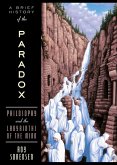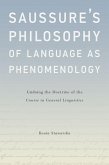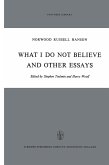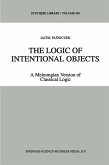- Gebundenes Buch
- Merkliste
- Auf die Merkliste
- Bewerten Bewerten
- Teilen
- Produkt teilen
- Produkterinnerung
- Produkterinnerung
David Carr outlines a distinctively phenomenological approach to history. Rather than asking what history is or how we know history, a phenomenology of history inquires into history as a phenomenon and into the experience of the historical.
Andere Kunden interessierten sich auch für
![Brief History of the Paradox Brief History of the Paradox]() Roy SorensenBrief History of the Paradox26,99 €
Roy SorensenBrief History of the Paradox26,99 €![Saussure's Philosophy of Language as Phenomenology Saussure's Philosophy of Language as Phenomenology]() Beata StawarskaSaussure's Philosophy of Language as Phenomenology119,99 €
Beata StawarskaSaussure's Philosophy of Language as Phenomenology119,99 €![Reworking the Bench Reworking the Bench]() Reworking the Bench113,99 €
Reworking the Bench113,99 €![Lived Experience of Forgiveness Lived Experience of Forgiveness]() Lived Experience of Forgiveness93,99 €
Lived Experience of Forgiveness93,99 €![What I Do Not Believe, and Other Essays What I Do Not Believe, and Other Essays]() N. R. HansonWhat I Do Not Believe, and Other Essays113,99 €
N. R. HansonWhat I Do Not Believe, and Other Essays113,99 €![Nature and Experience Nature and Experience]() Nature and Experience157,99 €
Nature and Experience157,99 €![The Logic of Intentional Objects The Logic of Intentional Objects]() Jacek PasniczekThe Logic of Intentional Objects76,99 €
Jacek PasniczekThe Logic of Intentional Objects76,99 €-
-
-
David Carr outlines a distinctively phenomenological approach to history. Rather than asking what history is or how we know history, a phenomenology of history inquires into history as a phenomenon and into the experience of the historical.
Produktdetails
- Produktdetails
- Verlag: OUP US
- Seitenzahl: 258
- Erscheinungstermin: 29. Juli 2014
- Englisch
- Abmessung: 240mm x 161mm x 20mm
- Gewicht: 602g
- ISBN-13: 9780199377657
- ISBN-10: 0199377650
- Artikelnr.: 40443538
- Herstellerkennzeichnung
- Libri GmbH
- Europaallee 1
- 36244 Bad Hersfeld
- gpsr@libri.de
- Verlag: OUP US
- Seitenzahl: 258
- Erscheinungstermin: 29. Juli 2014
- Englisch
- Abmessung: 240mm x 161mm x 20mm
- Gewicht: 602g
- ISBN-13: 9780199377657
- ISBN-10: 0199377650
- Artikelnr.: 40443538
- Herstellerkennzeichnung
- Libri GmbH
- Europaallee 1
- 36244 Bad Hersfeld
- gpsr@libri.de
David Carr is Charles Howard Candler Professor Emeritus of Philosophy at Emory University and Adjunct Professor of Philosophy at the New School for Social Research. He is also the author of The Paradox of Subjectivity: The Self in the Transcendental Tradition (OUP, 1999), Interpreting Husserl: Critical and Comparative Studies (1987), Time, Narrative, and History (1986), and Phenomenology and the Problem of History: A Study of Husserl's Transcendental Philosophy (1974).
Introduction: On the Phenomenology of History
1. The Phenomenological Question
2. Representation, Memory, Experience
3. Phenomenological Perspectives: an Outline
Chapter I: The Varieties of Experience
1. On the Concept of Experience and its Curious Fate
2. Experience and Innocence: The Empiricists
3. Experience in Kant and Hegel
4. So Far: Three Concepts of Experience
5. Dilthey, Husserl and a New Word: Erlebnis
6. From Mysticism to Pragmatism: Buber, James, Dewey
7. Taking Stock Again: How Many Concepts of Experience?
8. Experience and Foundationalism
9. Summing Up: Four Concepts of Experience
Chapter II: Experience and History
1. The Two Relevant Senses of Experience
2. Husserl on Temporality
3. Time and Experience
4. Intentionality
5. Objects, Events, World
6. Others and The Human World
7. Experience and Historicity
8. Being with Others
9. "We " and Community
10. Community and Historicity
11. History and Retrospection
12. The Experience of Historical Events
13. Levels of Temporality
14. The Significance of These Examples
Chapter III: Experience and The Philosophy of History
1. Taking Stock
2. Experience, Representation, Memory
3. Narrative Representation
4. Experience and Memory
5. What Kind of Philosophy of History Is This?
6. The Epistemology of History
7. The Metaphysics of History
Chapter IV: The Metaphysics of History and Its Critics
1. The Project of Re-reading the Philosophy of History
2. The Rise and Fall of the Classical Philosophy of History:
The Standard View
3. Hegel and his Alleged Predecessors
4. Hegel's Lectures and Their Reception
5. Twentieth Century Reactions
Chapter V: A Phenomenological Re-reading of the Classical Philosophy of History
1. Danto and "Metaphysics of Everyday Life "
2. Narrative and Everyday Life
3. Practical Narrative
4. Narrative and The Classical Philosophy of History
5. Narrative and The Social
6. The Project of Re-reading
7. Marx and Marxists
8. Hegel's Lectures Again
9. History and the Phenomenology of Spirit
10. Hegel as Reformer
11. Hegel and Beyond
12. Conclusion
Chapter VI: Phenomenologists on History
1. The Emergence of Nineteenth Century Historicism
2. Historicism and Marxism
3. Husserl and Dilthey
4. Husserl's Response to Historicism
5. Husserl's Crisis and a Different View of History
6. Philosophy of History in the Crisis
7. Phenomenology and The Epistemology of History
8. Phenomenology and Historicity in the Crisis
9. Coda: French Phenomenology of History
10. Conclusion
Chapter VII: Space, Time and History
1. Time Zones: Phenomenological Reflections on Cultural Time
a. Space and Place, Home and Beyond
b. Lived Space, Lived Time
c. The Universal Now
d. Time and The Other
e. Local Time, East and West
f. Conclusion: Cultural Time and the Contemporary World
2. Place and Time: On the Interplay of Historical Points of View
a. Place
b. The Reality of Others
c. Time
d. "Virtual History "
e. Narrative
f. Conclusion
Chapter VIII: Experience, Narrative and Historical Knowledge
1. History, Fiction and Human Time
a. Questioning the Distinction Between History and Fiction
b. A Response
c. Fiction and Falsehood
d. Knowledge and Imagination
e. Narrative and Reality
f. An Example
g. Conclusion
2. Narrative Explanation
3. Epistemology and Ontology of Narrative
BIBLIOGRAPHY
INDEX
1. The Phenomenological Question
2. Representation, Memory, Experience
3. Phenomenological Perspectives: an Outline
Chapter I: The Varieties of Experience
1. On the Concept of Experience and its Curious Fate
2. Experience and Innocence: The Empiricists
3. Experience in Kant and Hegel
4. So Far: Three Concepts of Experience
5. Dilthey, Husserl and a New Word: Erlebnis
6. From Mysticism to Pragmatism: Buber, James, Dewey
7. Taking Stock Again: How Many Concepts of Experience?
8. Experience and Foundationalism
9. Summing Up: Four Concepts of Experience
Chapter II: Experience and History
1. The Two Relevant Senses of Experience
2. Husserl on Temporality
3. Time and Experience
4. Intentionality
5. Objects, Events, World
6. Others and The Human World
7. Experience and Historicity
8. Being with Others
9. "We " and Community
10. Community and Historicity
11. History and Retrospection
12. The Experience of Historical Events
13. Levels of Temporality
14. The Significance of These Examples
Chapter III: Experience and The Philosophy of History
1. Taking Stock
2. Experience, Representation, Memory
3. Narrative Representation
4. Experience and Memory
5. What Kind of Philosophy of History Is This?
6. The Epistemology of History
7. The Metaphysics of History
Chapter IV: The Metaphysics of History and Its Critics
1. The Project of Re-reading the Philosophy of History
2. The Rise and Fall of the Classical Philosophy of History:
The Standard View
3. Hegel and his Alleged Predecessors
4. Hegel's Lectures and Their Reception
5. Twentieth Century Reactions
Chapter V: A Phenomenological Re-reading of the Classical Philosophy of History
1. Danto and "Metaphysics of Everyday Life "
2. Narrative and Everyday Life
3. Practical Narrative
4. Narrative and The Classical Philosophy of History
5. Narrative and The Social
6. The Project of Re-reading
7. Marx and Marxists
8. Hegel's Lectures Again
9. History and the Phenomenology of Spirit
10. Hegel as Reformer
11. Hegel and Beyond
12. Conclusion
Chapter VI: Phenomenologists on History
1. The Emergence of Nineteenth Century Historicism
2. Historicism and Marxism
3. Husserl and Dilthey
4. Husserl's Response to Historicism
5. Husserl's Crisis and a Different View of History
6. Philosophy of History in the Crisis
7. Phenomenology and The Epistemology of History
8. Phenomenology and Historicity in the Crisis
9. Coda: French Phenomenology of History
10. Conclusion
Chapter VII: Space, Time and History
1. Time Zones: Phenomenological Reflections on Cultural Time
a. Space and Place, Home and Beyond
b. Lived Space, Lived Time
c. The Universal Now
d. Time and The Other
e. Local Time, East and West
f. Conclusion: Cultural Time and the Contemporary World
2. Place and Time: On the Interplay of Historical Points of View
a. Place
b. The Reality of Others
c. Time
d. "Virtual History "
e. Narrative
f. Conclusion
Chapter VIII: Experience, Narrative and Historical Knowledge
1. History, Fiction and Human Time
a. Questioning the Distinction Between History and Fiction
b. A Response
c. Fiction and Falsehood
d. Knowledge and Imagination
e. Narrative and Reality
f. An Example
g. Conclusion
2. Narrative Explanation
3. Epistemology and Ontology of Narrative
BIBLIOGRAPHY
INDEX
Introduction: On the Phenomenology of History
1. The Phenomenological Question
2. Representation, Memory, Experience
3. Phenomenological Perspectives: an Outline
Chapter I: The Varieties of Experience
1. On the Concept of Experience and its Curious Fate
2. Experience and Innocence: The Empiricists
3. Experience in Kant and Hegel
4. So Far: Three Concepts of Experience
5. Dilthey, Husserl and a New Word: Erlebnis
6. From Mysticism to Pragmatism: Buber, James, Dewey
7. Taking Stock Again: How Many Concepts of Experience?
8. Experience and Foundationalism
9. Summing Up: Four Concepts of Experience
Chapter II: Experience and History
1. The Two Relevant Senses of Experience
2. Husserl on Temporality
3. Time and Experience
4. Intentionality
5. Objects, Events, World
6. Others and The Human World
7. Experience and Historicity
8. Being with Others
9. "We " and Community
10. Community and Historicity
11. History and Retrospection
12. The Experience of Historical Events
13. Levels of Temporality
14. The Significance of These Examples
Chapter III: Experience and The Philosophy of History
1. Taking Stock
2. Experience, Representation, Memory
3. Narrative Representation
4. Experience and Memory
5. What Kind of Philosophy of History Is This?
6. The Epistemology of History
7. The Metaphysics of History
Chapter IV: The Metaphysics of History and Its Critics
1. The Project of Re-reading the Philosophy of History
2. The Rise and Fall of the Classical Philosophy of History:
The Standard View
3. Hegel and his Alleged Predecessors
4. Hegel's Lectures and Their Reception
5. Twentieth Century Reactions
Chapter V: A Phenomenological Re-reading of the Classical Philosophy of History
1. Danto and "Metaphysics of Everyday Life "
2. Narrative and Everyday Life
3. Practical Narrative
4. Narrative and The Classical Philosophy of History
5. Narrative and The Social
6. The Project of Re-reading
7. Marx and Marxists
8. Hegel's Lectures Again
9. History and the Phenomenology of Spirit
10. Hegel as Reformer
11. Hegel and Beyond
12. Conclusion
Chapter VI: Phenomenologists on History
1. The Emergence of Nineteenth Century Historicism
2. Historicism and Marxism
3. Husserl and Dilthey
4. Husserl's Response to Historicism
5. Husserl's Crisis and a Different View of History
6. Philosophy of History in the Crisis
7. Phenomenology and The Epistemology of History
8. Phenomenology and Historicity in the Crisis
9. Coda: French Phenomenology of History
10. Conclusion
Chapter VII: Space, Time and History
1. Time Zones: Phenomenological Reflections on Cultural Time
a. Space and Place, Home and Beyond
b. Lived Space, Lived Time
c. The Universal Now
d. Time and The Other
e. Local Time, East and West
f. Conclusion: Cultural Time and the Contemporary World
2. Place and Time: On the Interplay of Historical Points of View
a. Place
b. The Reality of Others
c. Time
d. "Virtual History "
e. Narrative
f. Conclusion
Chapter VIII: Experience, Narrative and Historical Knowledge
1. History, Fiction and Human Time
a. Questioning the Distinction Between History and Fiction
b. A Response
c. Fiction and Falsehood
d. Knowledge and Imagination
e. Narrative and Reality
f. An Example
g. Conclusion
2. Narrative Explanation
3. Epistemology and Ontology of Narrative
BIBLIOGRAPHY
INDEX
1. The Phenomenological Question
2. Representation, Memory, Experience
3. Phenomenological Perspectives: an Outline
Chapter I: The Varieties of Experience
1. On the Concept of Experience and its Curious Fate
2. Experience and Innocence: The Empiricists
3. Experience in Kant and Hegel
4. So Far: Three Concepts of Experience
5. Dilthey, Husserl and a New Word: Erlebnis
6. From Mysticism to Pragmatism: Buber, James, Dewey
7. Taking Stock Again: How Many Concepts of Experience?
8. Experience and Foundationalism
9. Summing Up: Four Concepts of Experience
Chapter II: Experience and History
1. The Two Relevant Senses of Experience
2. Husserl on Temporality
3. Time and Experience
4. Intentionality
5. Objects, Events, World
6. Others and The Human World
7. Experience and Historicity
8. Being with Others
9. "We " and Community
10. Community and Historicity
11. History and Retrospection
12. The Experience of Historical Events
13. Levels of Temporality
14. The Significance of These Examples
Chapter III: Experience and The Philosophy of History
1. Taking Stock
2. Experience, Representation, Memory
3. Narrative Representation
4. Experience and Memory
5. What Kind of Philosophy of History Is This?
6. The Epistemology of History
7. The Metaphysics of History
Chapter IV: The Metaphysics of History and Its Critics
1. The Project of Re-reading the Philosophy of History
2. The Rise and Fall of the Classical Philosophy of History:
The Standard View
3. Hegel and his Alleged Predecessors
4. Hegel's Lectures and Their Reception
5. Twentieth Century Reactions
Chapter V: A Phenomenological Re-reading of the Classical Philosophy of History
1. Danto and "Metaphysics of Everyday Life "
2. Narrative and Everyday Life
3. Practical Narrative
4. Narrative and The Classical Philosophy of History
5. Narrative and The Social
6. The Project of Re-reading
7. Marx and Marxists
8. Hegel's Lectures Again
9. History and the Phenomenology of Spirit
10. Hegel as Reformer
11. Hegel and Beyond
12. Conclusion
Chapter VI: Phenomenologists on History
1. The Emergence of Nineteenth Century Historicism
2. Historicism and Marxism
3. Husserl and Dilthey
4. Husserl's Response to Historicism
5. Husserl's Crisis and a Different View of History
6. Philosophy of History in the Crisis
7. Phenomenology and The Epistemology of History
8. Phenomenology and Historicity in the Crisis
9. Coda: French Phenomenology of History
10. Conclusion
Chapter VII: Space, Time and History
1. Time Zones: Phenomenological Reflections on Cultural Time
a. Space and Place, Home and Beyond
b. Lived Space, Lived Time
c. The Universal Now
d. Time and The Other
e. Local Time, East and West
f. Conclusion: Cultural Time and the Contemporary World
2. Place and Time: On the Interplay of Historical Points of View
a. Place
b. The Reality of Others
c. Time
d. "Virtual History "
e. Narrative
f. Conclusion
Chapter VIII: Experience, Narrative and Historical Knowledge
1. History, Fiction and Human Time
a. Questioning the Distinction Between History and Fiction
b. A Response
c. Fiction and Falsehood
d. Knowledge and Imagination
e. Narrative and Reality
f. An Example
g. Conclusion
2. Narrative Explanation
3. Epistemology and Ontology of Narrative
BIBLIOGRAPHY
INDEX








